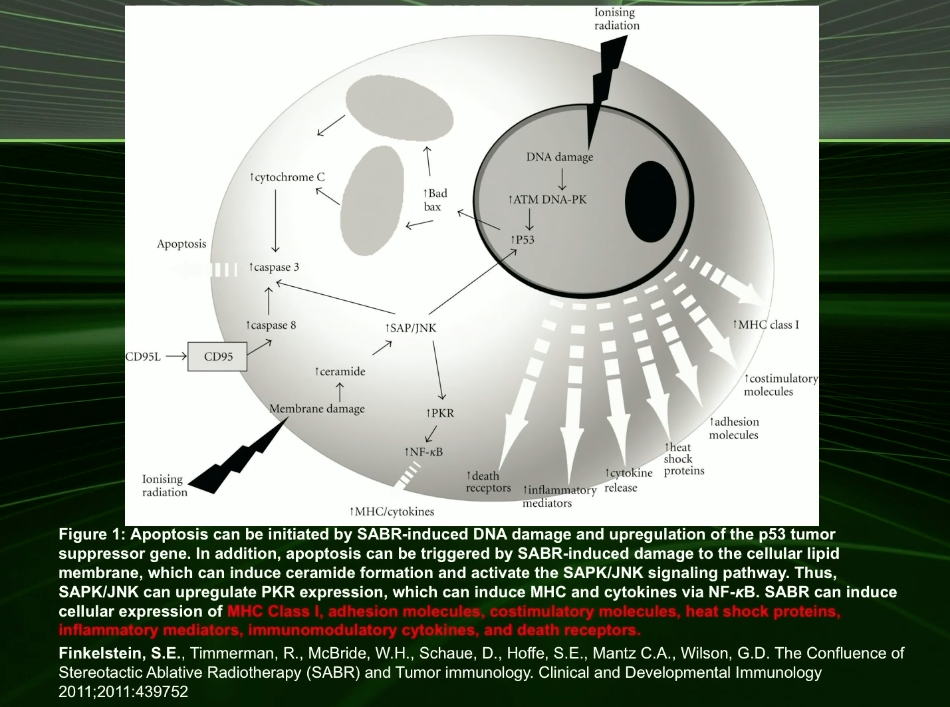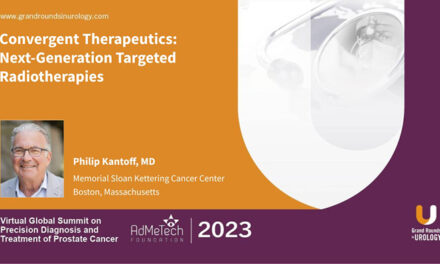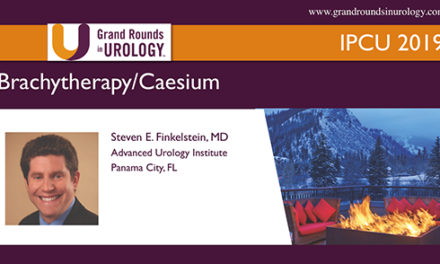Steven E. Finkelstein, MD, presented “Next Generation Updates in Radiation Oncology” during the 27th Annual Perspectives in Urology: Point Counterpoint on November 9, 2018 in Scottsdale, Arizona.
How to cite: Finkelstein, Steven E. “Next Generation Updates in Radiation Oncology” November 9, 2018. Accessed Jun 2025. https://grandroundsinurology.com/next-generation-updates-in-radiation-oncology/
Next Generation Updates in Radiation Oncology Summary:
Steven E. Finkelstein, MD, discusses radiobiologic concepts of different fractionation schedules for prostate cancer. He also reviews a 2018 guideline for hypofractionated external beam radiotherapy (EBRT) to treat localized prostate cancer, and its ramifications for the future of radiation oncology.
Abstract:
Although conventional wisdom dictates that the α/β ratio for prostate cancer is 10 and that optimal delivery should occur over 6 ½ to 9 weeks, there is no evidence to prove this is so. This uncertainty leads to the question: can fewer fractions of a higher dose generate better or equivalent cancer control with fewer complications, greater convenience, better patient acceptance, and a lower cost when compared to conventional fractionation?
To respond to this question, in 2018, the American Society for Radiation Oncology (ASTRO), American Society of Clinical Oncology (ASCO), and American Urological Association (AUA) created an evidence-based guideline on hypofractionated EBRT in localized prostate cancer. These recommendations apply to patients who require or prefer treatment instead of surveillance and have opted for EBRT.
This presentation provides commentary on this guideline’s recommendations regarding moderate hypofractionation and ultrahypofractionation, or stereotactic body radiation therapy (SBRT). The discussion will cover patient selection, suggested regimens, randomized trials, and cancer control and toxicity data for both techniques.
Of note, clinician technical expertise and radiation delivery planning are particularly important when performing SBRT. While the conventional method of delivering 45 treatments over 9 weeks allows for a margin of error in regards to hitting the target, a method limited to 5 treatments requires precise delivery. Therefore, the expert panel universally recommends image-guided radiation therapy and avoidance of non-modulated conformal techniques for SBRT.
In regards to the future of radiation oncology for prostate cancer, one should anticipate reactions to these guidelines. There is also a possibility for the emergence of a synergistic combination of radiation and immunotherapy.
About Perspectives in Urology: Point Counterpoint
Perspectives in Urology: Point Counterpoint (PCP) is an annual CME-accredited conference devoted to discussing and debating the latest topics in men’s health, general urology, and genitourinary cancers. The conference’s format includes more than didactic lectures. It also includes debates, point-counterpoint discussion panels, and unique case-based presentations. Dr. Finkelstein presented this lecture during the 27th PCP in 2018. Please visit this page in order to register for future PCP meetings.
ABOUT THE AUTHOR
Steven E. Finkelstein, MD, FACRO, is the Director of the Center of Advanced Radiation Excellence, and Director of Radiation Oncology Research for Associated Medical Professionals in Syracuse, New York. His interests include the research of a variety of cancers, busting radiation driven, and personalized systemic therapy. He holds three international patents in the field of cutting edge technologies.
Dr. Finkelstein received his medical degree from the University of Michigan Medical School, graduating cum laude eruditions causa. He then joined the National Cancer Institute, National Institutes of Health as Clinical Associate. He completed both Surgical Oncology Fellowship as well as Clinical Immunotherapy Fellowship, and an additional radiation oncology residency.
He served a residency in General Surgery at Washington University in Saint Louis, Missouri, Dr. Finkelstein also served fellowships in Biologic Immunotherapy, Clinical Cancer, and Surgical Oncology at the Surgery Branch of the National Cancer Institute in Bethesda, Maryland. He is a member of the American College of Radiation Oncology, the American Medical Association, the American Society of Clinical Oncology, the American Society for Therapeutic Radiology and Oncology, the Radiological Society of North America, and the Radiation Therapy Oncology Group.
He has served as a Co-Chair on the NRG Immunotherapy Committee, Co-Chair of the 2018-2019 ACRO Scientific Program Committee, and Chair of the SWOG Radiation STG Committee. He currently serves on the Board of Chancellors for ACRO. Dr. Finkelstein has also served as National Director of Translational Research Consortium (TRC), the cutting-edge therapy arm of 21st Century Oncology in Scottsdale, Arizona. Inspired by his grandmother, a cancer patient, he became a dedicated cancer surgeon who found that radiation therapy could sometimes do for his patients what surgery could not.






